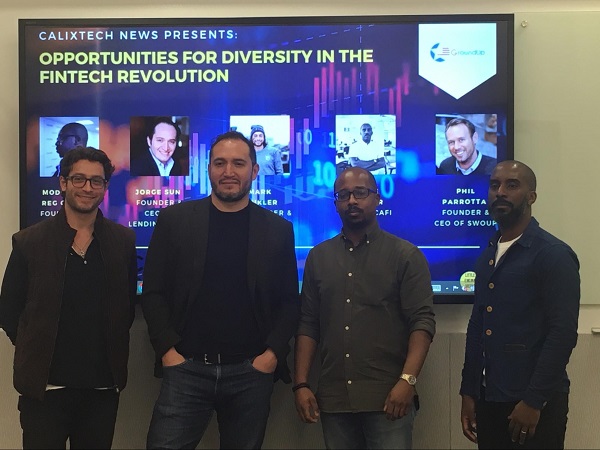Diversity and the FinTech Revolution Discussed at Newark Tech Week
A small crowd gathered at =SPACE, 2 Gateway Center, in Newark, on October 19 for a panel discussion titled “Opportunities for Diversity in the Fintech Revolution.” The discussion was a part of Newark Tech Week.
The panelists were Jorge Sun, cofounder and CEO of LendingPoint (Kennesaw, Ga.); Mark Smukler, cofounder and CEO of Bixby (Newark); and Steve Royster, chief marketing officer (CMO) of Mobility Capital Finance, or “MoCaFi” (Newark). Philip Parrotta, founder and CEO of Swoup (New York), was scheduled to join the panel, but was unable to make it.
Moderator Reginald Calixte, founder and CEO of Little Engine Media, was introduced by Medina, cofounder of Newark Tech Week, and founder of =SPACE. Calixte opened the conversation by defining “diversity” not just in terms of racial identity, but in terms of any group in our country that’s currently underserved or underrepresented in FinTech, and in the tech community overall.
The panelists recounted how they became involved in FinTech. Mark Smukler, originally a product designer, said that it happened for him by accident, when he created a product for a property manager. He found a market need for his product, and his involvement in FinTech grew from there.
Sun is a banker by trade. He began thinking about new ways to lend to small businesses, and to make the loan process more accessible to more people. He said, “Cash flow is king for small companies,” and it’s often a barrier for people from marginalized communities who are seeking to get a business off the ground.
Royster spent over 10 years on the business development side of entrepreneurship. He stressed that the opportunities for diversity in FinTech should extend beyond black and brown people to all underserved communities. Speaking from his perspective as a CMO, he said, “Owning a business isn’t the only way to be involved in FinTech. You can contribute to a company in so many ways and roles. Not everyone needs to be a CEO.”
When the Q&A session began, the conversation digressed for a bit, veering to such topics as marijuana and cryptocurrency before coming back to the primary focus of the discussion.
However, when Calixte asked about decentralization, Royster made a poignant comment, saying that “maybe Blockchain can possibly reduce cultural bias in interactions.” He was referring to the profound impact that interpersonal and cultural bias plays in lending, and in finance as a whole.
All the panelists clearly identified how FinTech ‒ and their companies, in particular ‒ have helped diverse populations by subverting the rules, regulations and cultural limitations of conventional financial institutions. For instance, traditional lending practices and regulations rule out most startups. Smukler said, “Most people know you’d never go to a bank as a startup asking for money.”
The panelists also noted that people from diverse communities may not have confidence in banking institutions, and they may have limited access to income ‒ two factors that limit their access to credit, capital and other financial incentives and opportunities.
Sun said, “FinTech is nontraditional. There are obvious holes to be filled in the conventional systems. FinTech is how we fill them. Players from diverse communities can get involved because the barriers to entry are gone.”
Despite all the access FinTech may provide, this access is still limited because it’s dependent on access to technology in general, whether by phone or the internet, and this is a barrier that restricts opportunities for many people.
In conclusion, Calixte summed things up very aptly: “FinTech is perhaps addressing the symptoms for the lack of opportunities for diversity, but not the actual cause.”




